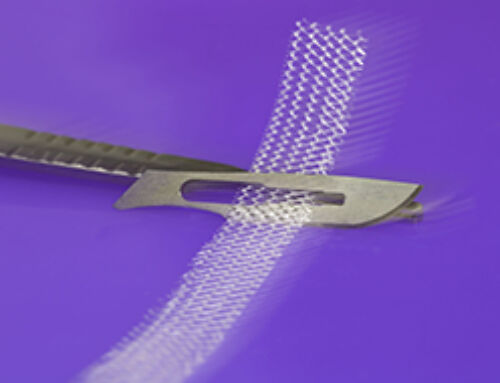PVDF meshes produce less scarring due to their higher biocompatibility, reducing the incidence of postoperative chronic pain complications
Compared with traditional polypropylene meshes, PVDF meshes demonstrated better biostability, less focal inflammation or fibrosis in host tissue, and lower bending stiffness in a previous study … Therefore, it appears that PVDF meshes produce less scarring due to their higher biocompatibility, reducing the incidence of postoperative chronic pain complications” … Chia-Ju Lin. Diagnostics 2023, 13, 2991.
What did the study show for the treatment of women with anterior/apical vaginal prolapse with a mean follow-up period for those implanted at 3 years? Twenty-three patients (85.2%) achieved postoperative anatomic success, while four patients (14.8%) experienced Stage II cystocele. All recurrent cases were asymptomatic. During outpatient follow-up, one patient (3.7%) was found to have mesh protrusion. No vaginal oozing, pain, or negative impact on intercourse was reported. One patient (3.7%) complained of buttock pain during a visit. The three-year objective outcome revealed a subjective/objective success rate of 100%/85.2%, respectively. The recurrent rate was 14.8%, with all cases involving the anterior compartment, or within the hymen, and all were asymptomatic. Overall, there were improvements in vaginal symptoms, quality of life, and sexual satisfaction postoperatively, as measured by PFDI-20, IIQ-7, and PISQ-12.
“There is no real downside to using PVDF when compared to polypropylene except for cost. In other words, profits are more important than safety in the United States.” — Greg Vigna, MD, JD
Dr. Greg Vigna, mid-urethral sling attorney, “The polypropylene mid-urethral sling experiment has played out and any objective person would conclude that it is an ongoing disaster that has caused 7.9% of women to undergo another surgery to remove or cut the mesh for complications caused by it and 17.9% of women will undergo a surgical treatment for failed treatment of stress urinary incontinence at 15-years. To date, the FDA does not support the safety of these polypropylene mid-urethral slings past one year.” Dr. Vigna continues, “Polyvinylidene fluoride (PVDF) is a biomaterial used nearly everywhere else in the world but is not in the United States. PVDF is available for mid-urethral slings outside the United States and appears to be safer with less pain and erosions. There is no real downside to using PVDF when compared to polypropylene except for cost. In other words, profits are more important than safety in the United States.”
Vigna Law Group is investigating the Red Flag Warning symptoms of neurological injury from mid-urethral slings include:
- Groin pain
- Hip pain
- Inability to wear tight paints
- Clitoral pain or numbness
- Severe pain that makes vaginal penetration impossible
- Tailbone pain
- Anorectal pain
- Painful bladder
- Pain with sitting
Dr. Vigna is a California and Washington DC lawyer who focuses on catastrophic injuries and the neurological injuries caused by mid-urethral slings including pudendal neuralgia, obturator neuralgia, ilioinguinal neuralgia, and complex regional pain syndrome. Ben Martin is a national pharmaceutical injury attorney in Dallas, Texas. The lawyers represent women in courts across the country.
To learn more on the anatomical basis for TOT complications including obturator and pudendal neuralgia and the treatments of obturator and pudendal neuralgia, click here.
Click here for a FREE BOOK on Vaginal Mesh Pain.
For articles, video resources, and information visit the Pudendal Neuralgia Educational Portal (https://pudendalportal.lifecare123.com/) or https://tvm.lifecare123.com/.
Click here for information regarding sling-related complications.
Resources
https://en.dyna-mesh.com
https://repositorio.uchile.cl/bitstream/handle/2250/139184/Comparative-study-of-
polyvinylidene-%20uoride.pdf?sequence=1
https://onlinelibrary.wiley.com/doi/pdfdirect/10.1002/nau.24586
https://www.sciencedirect.com/science/article/pii/S1743919117301280
https://www.mdpi.com/2075-4418/13/18/2991
Dejene, Funk, Pate, Jennifer M. Wu. Long-Term Outcomes After Midurethral Mesh Sling
Surgery for Stress Urinary Incontinence. Female Pelvic Med Reconstr Surg 2022; 28: 188-193.
Greg Vigna
Greg Vigna, M.D., J.D.
+18058959675 ext.
email us here





